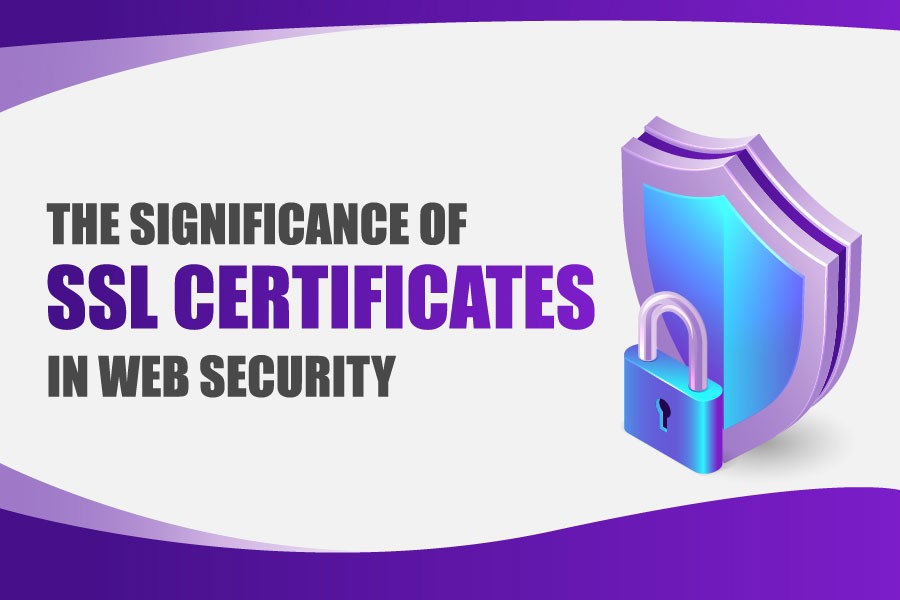Security stats show that over $2.9 million is lost every minute to cyberattacks. As of the year 2020, the average cost of data breach amounted to $3.86 Million. By January 2021, Google had registered over 2 million phishing sites, representing a 27% increase in 12 months! Therefore, a Secure Socket Layer certificate, otherwise known as an SSL certificate, is now more of a necessity than a choice for your website.
There are many other benefits of SSL in web security. Let us look into some of the key benefits of SSL certificates in web security.
Enhancing Web Security
When you install an SSL certificate, you are essentially installing a piece of code on the server where the site is hosted. You will notice that a small padlock icon is displayed on the browser to the left of the site URL.
The URL has now switched from the traditional HTTP to the more secure HTTPS version. The certificate will ensure that data transferred to and from a website is secure using encryption algorithms that make it hard for eavesdroppers to decipher the messages.
This way, sensitive information such as credit card information, data transfers, logins, passwords are secure from cyberattacks.
On the flip side, running the traditional HTTP version is now unsafe given the data is transmitted in text format. Hackers or cyber-criminals can tap them on transit. Google has been trying to encourage the switch from HTTP to HTTPS. For example, in 2018, they released Google Chrome 68, which saw websites without SSL certificates installed flagged as unsecure. Of course, this can scare off users leading to loss of traffic and business!
Remember, data breaches are very costly and can cripple any business. So, do not take chances!
Tip: Start by securing your site with SSL. Use this along with other approaches like using firewalls, antimalware tools, backups, etc.
Improve Your Search Engine Ranking
To have your websites ranked at the top by relevant online searches is crucial for traffic and, ultimately, conversions. Well, SSL does affect your rankings. In 2014, Google changed its algorithm to incorporate SSL certificates as a key factor in the ranking algorithm. This means that secure HTTPS websites are given the upper hand and ranked higher than unsecure HTTP sites. Of course, a boost in search engine rankings will give your business a competitive edge over your competition.
It will help you in:
- Increasing the traffic to the site
- Growing volume of your potential customers
- generating more revenue and higher return on investment
- Increase traffic conversion
- Boosting your online business reputation
Boost your customer trust
Trust is everything in the online world, more so in eCommerce websites where you don’t have a physical interaction with the consumer. SSL certificates are very paramount from the customers’ perspective. They now act as a visual cue that assures customers of security. Customers want to know that the data they share on your site is private and protected.
Research by Gartner showed that 70 percent of online shoppers canceled their orders since they could not trust the sites. This is another reason why you need to buy cheap SSL certificate. It will help you increase your site traffic, improve your customers’ trust, and increase your conversion rates.
SSL certificate confirms your identity
Well, these days, there has been a rise in deception online. Credible sites can be cloned and used to executed attacks like phishing attacks. Imagine the misfortune of a customer sharing credit card details on a fake site! This is where an SSL certificate is good at affirming your identity and differentiating your sites from malicious ones.
SSL Certificates are issued only by publicly trusted Certificate Authorities (CA). The CA adds the correct unique public key to the correct domain name in the SSL certificate. This is a way of identifying and authenticating a site.
It is a rigorous verification and validation process set by the Certificate Authority. Upon successful identity validation process, your website is issued with trust indicators assuring your integrity. The process of validation will vary depending on the type of certificate you buy. The common types are Extended Validation SSL, Organization Validation SSL and Domain Validation SSL.
A point to note, all these types of SSL certificates offer the same level of data encryption, but they differ in the validation and verification process.
Comply with the PCI/ DSS Regulations
If you are running an eCommerce website that receives online payment, your website must be payment card industry compliant. The payment card industry has set rules, guidelines, and requirements for accepting, processing, storing, and online transmission of payment card information. They are mainly known as PCI/DSS standards. They were developed in the year 2006 with a set of guidelines intended to secure and manage online transaction processes.
To meet the PCI/DSS requirement, installing an SSL certificate is one of the 12 mandatory requirements. In other words, it is a way to comply with data regulations in the industry.
Avoid Data Breaches!
It can be very expensive for your business to have customer data lost or compromised. Think about the legal litigations, lost reputation, and repercussions for your business. Prevention is better than cure! Save yourself the hassle by embracing preventive security measures that could protect you from potential financial losses. Install an SSL certificate on your website and prevent the potential of your customers’ data loss or data breach.
Wrapping up
Website security is crucial to any online user. It is the website owner’s responsibility to ensure that visitors’ data is safe, private, and secure. SSL certificates play a vital role in enhancing web security. It also offers numerous advantages, including boosting your SEO performance. They also assure your customers that they can trust you and more.
The beauty is that SSL certificates are very cheap compared to the robust benefits they offer. So, get a good SSL certificate installed on your website from best SSL certificate providers today as a way to bolster web security, integrity, and trust.






